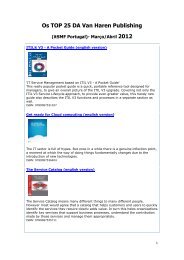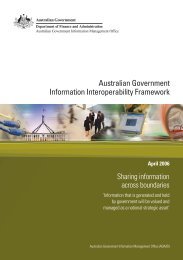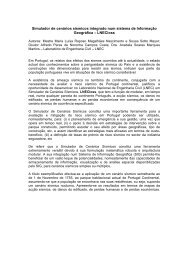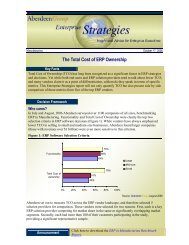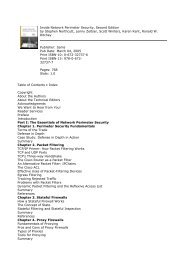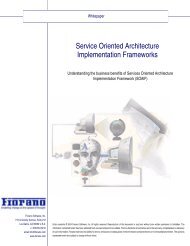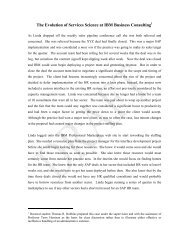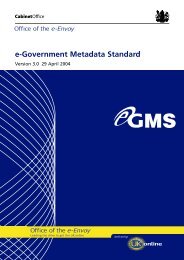OECD Peer Review of E-Government in Denmark - ePractice.eu
OECD Peer Review of E-Government in Denmark - ePractice.eu
OECD Peer Review of E-Government in Denmark - ePractice.eu
You also want an ePaper? Increase the reach of your titles
YUMPU automatically turns print PDFs into web optimized ePapers that Google loves.
with even lower rank<strong>in</strong>gs for drivers related to strengthened citizen engagement and trust <strong>in</strong><br />
government, and improved government transparency and accountability – re<strong>in</strong>force the existence <strong>of</strong><br />
this bias.<br />
Figure 4.3 Importance <strong>of</strong> reasons for e-government implementation<br />
Enable efficiency ga<strong>in</strong>s<br />
Improve <strong>in</strong>ternal and external co-ord<strong>in</strong>ation <strong>of</strong> processes<br />
Contribute to economic policy objectives<br />
Respond to external pressure from citizens, bus<strong>in</strong>esses, other government<br />
organisations and/or civil society<br />
Improve technical quality <strong>of</strong> services (e.g. service reliability, security)<br />
Strengthen citizen engagement and trust <strong>in</strong> government<br />
Improve policy effectiveness<br />
Improve transparency and accountability <strong>of</strong> the adm<strong>in</strong>istration<br />
Compilation and dissem<strong>in</strong>ation <strong>of</strong> statistical data, metadata exchange<br />
0% 20% 40% 60% 80% 100%<br />
Very important Important Somewhat important Not important Not applicable<br />
Source: <strong>OECD</strong> E-<strong>Government</strong> Survey: <strong>Denmark</strong>.<br />
The bias towards efficiency objectives may reflect the emphasis <strong>of</strong> the surround<strong>in</strong>g ICT policy<br />
environment, where Us<strong>in</strong>g IT Wisely (2003) emphasises effective and efficient utilisation <strong>of</strong> ICT by<br />
the public sector. It may <strong>in</strong>dicate that organisations’ priorities are <strong>in</strong>fluenced by the fact that the<br />
M<strong>in</strong>istry <strong>of</strong> F<strong>in</strong>ance is responsible for e-government. It may be, <strong>in</strong> part, a result <strong>of</strong> Danes’ overall<br />
satisfaction with, and trust <strong>in</strong>, government which may be lead<strong>in</strong>g to a lack <strong>of</strong> strong pressures on<br />
organisations to improve their performance <strong>in</strong> other areas. It may also be a result <strong>of</strong> efficiency be<strong>in</strong>g<br />
an aspect <strong>of</strong> their performance that is easier for government organisations to target and measure than<br />
factors such as customer needs and expectations, and attitudes towards organisations and their<br />
services. Whatever the reason, while a strong focus on improv<strong>in</strong>g efficiency through e-government is<br />
obviously essential to achiev<strong>in</strong>g the <strong>Government</strong>’s goals (both for e-government and <strong>in</strong> other policy<br />
areas), it is important that the other opportunities and benefits that can be realised through<br />
e-government are not overlooked. This situation suggests that more communication between the top<br />
level <strong>of</strong> e-government and government organisations about the purpose <strong>of</strong> the e-government<br />
programme may be worthwhile.<br />
70






